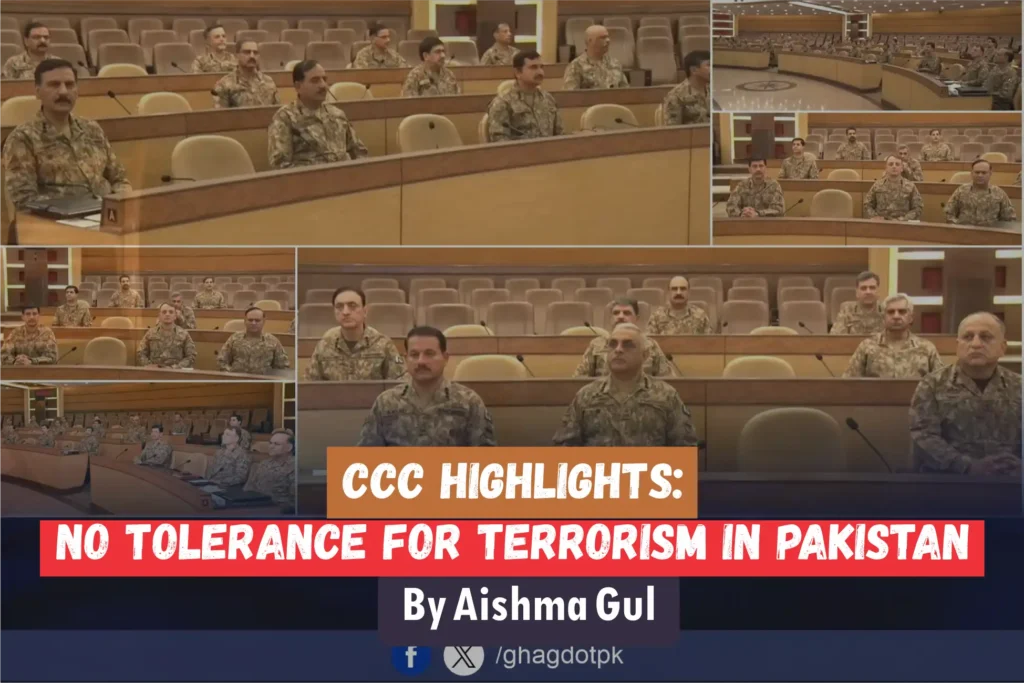By Aishma Gul
“No One Will Be Allowed to Disrupt Peace in Balochistan”, Chief of Army Staff’s Resolve at 268th Corps Commanders’ Conference
General Asim Munir’s strong message regarding Balochistan was the highlight of the 268th Corps Commanders’ Conference (CCC) held at the General Headquarters (GHQ) on 04 April 2025. The forum, chaired by the COAS himself, emphasized an integrated approach to meet both the protracted and emerging security challenges while reiterating Pakistan’s strategic determination on all frontiers.
Such elements, including “so-called political supporters” prioritizing narrow interests, would face decisive action with public backing, the COAS stressed.
Key Points of 268th Corps Commanders’ Conference
The meeting paid tribute to the supreme sacrifices of the Armed Forces, Law Enforcement Agencies, and civilians which was an acknowledgement of the heavy price paid to maintain peace and stability.
The forum was then given an extensive briefing on:
– Geo-strategic Dynamics: An in-depth analysis of regional trends, reflecting the latest academic studies that highlight evolving threats in South Asia. In this context, the term geo‑strategic environment is pivotal. It refers to how geographical factors—such as location, terrain, and proximity to volatile regions—influence political decisions and military strategies. Pakistan’s focus on regions like Balochistan reflects an understanding that stability in these areas is critical for national security.
– National Security Challenges: Discussion focused on both internal and external threats, including terrorism, and illicit economic and social activities. Here, national security challenges range across all drivers of instability—from cyber‑attacks to conventional armed conflict.
– Operational Readiness: Stressing the importance of retaining maximum preparations for war, the Chief of Army Staff stressed that operational preparedness is not only about having the right men and material but also about the synergy of zero-time inter‑institutional coordination. These principles serve to emphasize the importance of ongoing training and readiness for an agile response to new threats.
A significant part of the speech focused on the state’s willful stand against terrorism. “Pakistan Army will extend full support to the government and law enforcement agencies (LEAs) in enforcing stringent legal measures against illicit economic activities, which are intrinsically linked to the financing of terrorism,” Gen Asim Munir said.
Vision Azm-e-Istehkam and the National Action Plan (NAP)
The forum’s focus on Vision Azm-e-Istehkam under the National Action Plan highlights a strategic shift towards a whole-of-nation approach. The COAS hailed the establishment of District Coordination Committees (DCCs) all over Pakistan, whilst stating their crucial importance in:
– Inter-agency Coordination: This facilitates smooth cooperation between federal and provincial agencies, reflecting the principle that effective security relies on strong partnerships between various agencies, something that is also implemented in security models in several Western democracies.
– Local Governance: Empowering regional administrations to implement stringent security measures while upholding constitutional guarantees. Here, the localised approach echoes similar successful community policing and governance models deployed by other nations, including South Korea.
– Expedited Response: Improving the capability to respond to new threats through coordinated intelligence and rapid deployment of resources.
Such efforts align with global patterns in which decentralized coordination has been instrumental in reducing domestic terrorism and improving public safety. Rather, comparative analyses with international models, including community policing initiatives in Western democracies, demonstrate that localized governance can provide exponential fortification of national security without sacrificing civil liberties.
Tackling the Regional and International Security Concerns
The forum also addressed broader regional dynamics, specifically:
– KP and Balochistan Relevance: Emphasizing the critical role these regions play in national stability, the COAS’s statements reinforce ongoing efforts to secure borders and safeguard internal diversity.
– IIOJK and Ceasefire Violations: Expressing deep concern over human rights violations in Indian Illegally Occupied Jammu and Kashmir (IIOJK), the forum commended Pakistan’s resolute advocacy in support of the oppressed and called for continued diplomatic efforts. This resonates with international human rights research that tracks the consequences of long-term military tensions on civilian populations.
– Solidarity with Palestine: The forum also, to bring Pakistan’s policy in line with the broader global discourse on human rights, stating its unequivocal solidarity with the people of Palestine, condemning the war crimes in Gaza.
Global Perspectives and Future Directions
The COAS’s remarks are part of a broader narrative in which Pakistan’s military and security forces are adapting to an ever-evolving global security environment. The fundamental lesson emerging from international case studies is that hard and soft power needs to be part of a robust and multi-layered security framework for long-term stability. In the past, such concomitant, integrated strategies in Eastern Europe and the Middle East have led to measurable successes when used to combat terrorism.
Under COAS General Asim Munir’s leadership, the 268th Corps Commanders’ Conference has reinforced Pakistan’s commitment to protecting its borders and preserving national sovereignty. The focused attention on regions such as Balochistan, combined with a clear approach to combating terrorism and upholding human rights, illustrates a well-rounded stance on national security—one that is both strong and adaptable. As Pakistan continues to steer through a complex geopolitical environment, the blending of localized governance with national strategy stands out as a crucial route to achieving lasting peace and stability.
In essence, the outcomes of the CCC reveal a deep understanding of hybrid warfare, where external proxies and internal instability intersect. The military’s promise to safeguard peace in Balochistan and dismantle networks that finance terror must be supported by steadfast political resolve and widespread public confidence. As COAS asserted, “There is no space for terrorists and their facilitators in Pakistan”—a vision that calls for unwavering implementation to secure long-term stability and regional credibility.
(April 10th, 2025)






